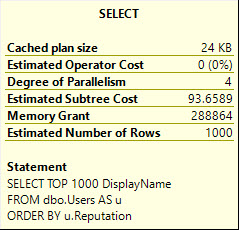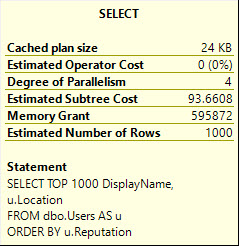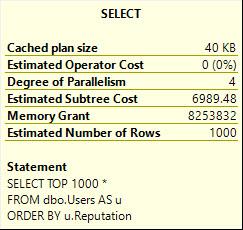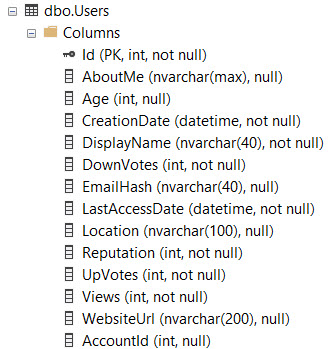The two reasons that I find the most compelling not to use SELECT * in SQL Server are
- Memory Grants
- Index usage
Memory Grants
When queries need to Sort, Hash, or go Parallel, they ask for memory for those operations. The size of the memory grant is based on the size of the data, both row and column wise.
String data especially has an impact on this, since the optimizer guesses half of the defined length as the 'fullness' of the column. So for a VARCHAR 100, it's 50 bytes * the number of rows.
Using Stack Overflow as an example, if I run these queries against the Users table:
SELECT TOP 1000 DisplayName
FROM dbo.Users AS u
ORDER BY u.Reputation;
SELECT TOP 1000 DisplayName, u.Location
FROM dbo.Users AS u
ORDER BY u.Reputation;
DisplayName is NVARCHAR 40, and Location is NVARCHAR 100.
Without an index on Reputation, SQL Server needs to sort the data on its own.

But the memory it nearly doubles.
DisplayName:

DisplayName, Location:

This gets much worse with SELECT *, asking for 8.2 GB of memory:

It does this to cope with the larger amount of data it needs to pass through the Sort operator, including the AboutMe column, which has a MAX length.

Index Usage
If I have this index on the Users table:
CREATE NONCLUSTERED INDEX ix_Users
ON dbo.Users
(
CreationDate ASC,
Reputation ASC,
Id ASC
);
And I have this query, with a WHERE clause that matches the index, but doesn't cover/include all the columns the query is selecting...
SELECT u.*,
p.Id AS [PostId]
FROM dbo.Users AS u
JOIN dbo.Posts AS p
ON p.OwnerUserId = u.Id
WHERE u.CreationDate > '20171001'
AND u.Reputation > 100
AND p.PostTypeId = 1
ORDER BY u.Id
The optimizer may choose not to use the narrow index with a key lookup, in favor of just scanning the clustered index.

You would either have to create a very wide index, or experiment with rewrites to get the narrow index chosen, even though using the narrow index results in a much faster query.

CX:
SQL Server Execution Times:
CPU time = 6374 ms, elapsed time = 4165 ms.
NC:
SQL Server Execution Times:
CPU time = 1623 ms, elapsed time = 875 ms.







